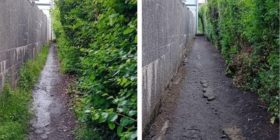Perennial Problems With Deliberately-Set Grass Fires In Parts Of Wales
Members will be aware that we have had perennial problems with deliberately-set grass fires in parts of Wales and will recall the severe problems we had a year ago. In April last year the First Minister held a summit on these issues, which I attended along with the Ministers for Natural Resources and Education and Skills. The summit brought together key organisations to formulate a co-ordinated programme of action to address the issue of grass fires in the short, medium and long-term, based on education, land management and deterrence with commitments from the Police, Fire and Rescue, Natural Resources Wales, Local Authorities and the Welsh Government. We and our partners have spent the past year developing actions to combat grass fire outbreaks and sharpen the emergency response to them.
Deliberate grass fire setting is irresponsible, dangerous and criminal. It destroys the environment, kills wildlife and livestock and puts communities at serious risk. We know from research conducted by Public Health Wales and Public Health England that it exposes large numbers of people to toxic smoke with potentially serious long-term health damage. Firefighters have to risk their lives to tackle this menace – at the expense of being able to respond to other emergencies. Those who are caught setting grass fires are rightly punished with the full rigour of the law. They are normally charged with arson, which carries a maximum sentence of life in prison. I commend the work of both firefighters and police in the actions that they have taken.
Following last year’s outbreaks, our statisticians have worked with Fire and Rescue Authorities (FRAs) to map grass fires in greater detail, to identify spatial and seasonal trends in their occurrence. FRAs and their partners can use this intelligence to focus their resources effectively.
This is not an easy offence to detect. In many parts of Wales, the proximity of towns to uncultivated grassland or forestry means that there are ample opportunities to set grass fires. At this time of year, much vegetation is dead, and burns very readily if the weather is dry. The most effective way of tackling grass fires is to prevent them in the first place.
That is what we and partners have been doing. Fire and Rescue Authorities deliver several programmes to divert children and young people away from deliberately setting fires. This work continues throughout the year and addresses all age groups, since arrests show that this is not simply an issue where perpetrators are always young people. It includes hard-hitting educational campaigns as well as intensive interventions with known or likely offenders. It is delivered in full collaboration with schools, police and other agencies, and is funded by the Welsh Government.
For instance, the ‘Bernie’ campaign for this year was launched by South Wales FRA on 2 February at Darran Park School in Ferndale. ‘Bernie’ is a publicity campaign targeting primary school children, which engages and educates them on the potential consequences of deliberately setting grass and mountain fires – especially when it comes to their homes, the landscape and local wildlife.
More intensive programmes such as ‘Crimes and Consequences’ and ‘Phoenix’ operate throughout the year and across Wales. They work with small groups at risk of offending and aim to instil more positive and socially responsible behaviours. For example, the Crimes and Consequences team have been working in partnership with StreetGames Wales in Blaenau Gwent to provide areas for children to play sports whilst giving out messages about offending and deliberate fire setting.
The FRAs have also been working with community, environmental and wildlife groups to draw on the goodwill that exists in the wider community to protect our natural environment from these fires.
To supplement initiatives on prevention in relation to potential fire-setters we have also undertaken work to inhibit the spread of fires. Natural Resources Wales has examined how changes in land and forestry management methods can be used to make grasslands less conducive to fires or be better structured to control the spread of fires. They have worked with the Fire Service and landowners to develop such methods. Firefighters have also been involved in developing firebreaks on some of our valleys’ hillsides, using the latest techniques learned internationally.
However, no preventative programme can ever eliminate grass fires completely. So it is vital that our firefighters are able to respond swiftly, safely and effectively to any outbreaks.
This morning, I visited Hirwaun Fire Station, one of many whose crews are likely to be on the front line in any repeat of last year’s outbreaks. Their professionalism and dedication in keeping our communities safe deserves the utmost respect. So I was very pleased to be able to see at first hand two types of equipment which the Welsh Government has funded to help them and their colleagues tackle grass fires
The first is a set of new all-terrain fire vehicles which will assist in tackling large grassland fires on areas of rough terrain, where larger appliances cannot reach the outbreak. The vehicles are invaluable to ensure firefighters can get to a blaze wherever it occurs as quickly and safely as possible to prevent further damage.
The second are sets of special Personal Protective Equipment (PPE) designed to keep firefighters safe in these types of situation. Firefighters’ normal PPE is designed for fires in buildings. It is too heavy and inflexible to be worn when covering large distances on foot to reach and fight a grass fire. The PPE we have now provided is much lighter and easier to wear, without compromising the protection firefighters need.
The Welsh Government has also previously provided funding for the Mid and West Wales FRA to purchase an Unmanned Aerial Vehicle, or drone, to assist in a range of fire and rescue activities. It can provide vital intelligence about the spread of a grass fire much more accurately and safely than from ground level, meaning crews and equipment can be more quickly and effectively deployed. This equipment has already proved invaluable. While many emergency services are now exploring this technology, Mid and West Wales is one of only four FRAs in the UK to be licensed by the Civil Aviation Authority to operate drones professionally. I am therefore pleased to announce funding for a second, larger drone with even greater capability, including flying at night and in bad weather.
Grass fire outbreaks are a blight on the environment and a grave threat to public safety. But last year they prompted an enormously positive community response, in terms of providing information and support to our firefighters and police officers. That reflected an obvious level of concern for safety, as well as condemnation of those responsible.
At a national level, we have reviewed plans for addressing outbreaks this year in the Wales Resilience Forum, in which the Fire and Rescue Authorities, Police, Natural Resources Wales and other agencies are engaged. Working through the Joint Arson Group, the Joint Emergency Services Group will continue to co-ordinate multi-agency operations and initiatives across Wales to reduce the instances of grass fires. We are clear that our emergency services are well prepared for the challenges which may face them this year.
Spotted something? Got a story? Email News@News.Wales









